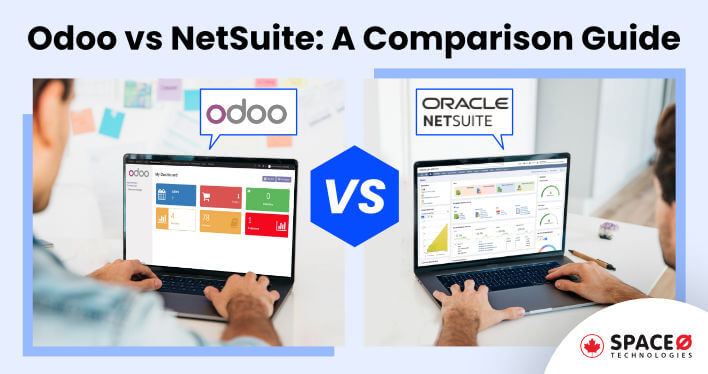When it’s about picking the top ERP for your company, deciding between Odoo and NetSuite is a tough call.
On one side, NetSuite is an ERP cloud software known for its strong finance management and reporting features. Though its high rates are out of many companies’ price range.
Odoo is another strong ERP software that is open-source software and more affordable. It may not have as wide of coverage for complex configurations though.
Although NetSuite and Odoo have distinct advantages, your decision depends on your budget and the complexity of your business requirements.
If you are considering picking Odoo ERP, we can help you with the implementation. As a leading Odoo development company, we specialize in handling the entire implementation from configuring the base system to designing custom modules and integrations.
Now, let’s begin with a complete comparison of Odoo vs NetSuite.
Table of Contents
What is Odoo?
Odoo is an all-inclusive cloud-based suite of open-source business management software with integrated applications. This ERP system helps manage routine tasks and improve business performance. Some of the core business operations include.
- Accounting and Financial Management
- Inventory Management
- Sales and Customer Relationship Management (CRM)
- Manufacturing and Production
- Human Resources Management
Pros and Cons of Odoo ERP Solution
Here is the table with an overview of the pros and cons of the Odoo.
| Pros of Odoo | Cons of Odoo |
|---|---|
| Allows extensive customization to meet unique business requirements. | Requires in-depth knowledge of complex customizations. |
| It’s an open-source solution with a vibrant community for ongoing development and support. | Built-in reporting features may not meet specific requirements. |
| Provides cost-effective solutions suitable for small and medium-sized companies. | Initial setup takes time for complex configurations. |
| You can easily expand Odoo ERP as your business grows, accommodating increased requirements. | – |
This table provides a complete explanation of the pros and cons of Odoo.
Which Types of Companies Choose Odoo?
Here are the types of companies that choose Odoo:
- Odoo is an ideal choice for small and medium-sized companies looking for affordability.
- Fast-growing companies prefer Odoo for its scalability.
- Manufacturing companies optimize production with Odoo.
- Retailers select Odoo to take advantage of core ERP functionality like POS and eCommerce.
If your company falls into any of these categories and you are considering Odoo as your ERP solution, it’s essential to understand the full range of services available. Our Odoo consulting services can help you get valuable insights into how specialized consulting can enhance the benefits of Odoo for your specific business needs.
Want to Implement Odoo into Your Business?
Our team will thoroughly assess your needs and facilitate seamless data migration using industry-standard ETL techniques.
Now, let’s discuss what is NetSuite.
What is NetSuite?
NetSuite is an all-in-one cloud-based enterprise resource planning software that connects various business applications. This integrated software solution helps in managing and optimizing business operations that include.
- Revenue and Expense Management
- Customer Relationship Management (CRM)
- eCommerce and Online Retail
- Inventory Control
- Procurement and Supply Chain Management
Pros and Cons of NetSuite ERP Solution
Here is the table with an overview of the pros and cons of the NetSuite.
| Pros of NetSuite | Cons of NetSuite |
|---|---|
| NetSuite offers vast functionality for core business processes. | NetSuite’s pricing structure may not be suitable for small businesses. |
| Easy integration with other Oracle cloud solutions. | It requires training and expertise to implement and manage NetSuite. |
| The complex requirements of large companies are easily met by NetSuite’s architecture. | The cost of constant maintenance and support adds to the total cost of ownership for NetSuite. |
| It allows organizations with a worldwide presence to run multi-location and multi-subsidiary operations. | – |
Let’s discuss which type of companies choose NetSuite.
Which Types of Companies Choose NetSuite?
Here are the types of companies that choose NetSuite:
- NetSuite is used by medium to large-sized businesses because of its scalability and functionalities.
- Companies with a worldwide presence select NetSuite for multi-location assistance.
- Online enterprises gain advantages from NetSuite’s eCommerce functionalities.
- NetSuite helps manufacturers and distributors improve operational efficiency.
After discussing both Odoo and NetSuite, check out the following section which contains a complete comparison
A Complete Comparison of Odoo and NetSuite
Here is a complete comparison of Odoo and NetSuite.
-
Total Cost of Ownership (TCO)
Odoo: Startups and SMEs find Odoo cost-effective when considering TCO. Because of its modular architecture, which lowers upfront costs by beginning with basic components and then adding more, organizations can keep spending under control. This method makes Odoo a lower-cost pricing model.
NetSuite: NetSuite’s TCO may seem to be greater at first, particularly for smaller enterprises. However, its subscription-based approach offers important services and maintenance, minimizing the need for substantial IT resources. NetSuite’s TCO correlates with complicated demands and worldwide development in bigger organizations.
Winner: The TCO winner relies on company size and long-term goals. Odoo is ideal for startups and SMEs looking for cost savings, but NetSuite is preferred by bigger organizations with extensive operations. -
Robust Functionality Comparison
Here is a feature comparison table for both NetSuite and Odoo across multiple categories.
Financial Management
Feature Odoo NetSuite Accounts Payable and Receivable ✓ ✓ Budgeting and Forecasting ✓ ✓ Tax Management ✓ ✓ Multi-Currency Support ✓ ✓ Financial Planning and Reporting ✓ ✓ Expense Management ✓ ✗ Advanced Financial Analytics ✓ ✗ Vendor Bills Management ✓ ✗ CRM
Feature Odoo NetSuite Contact Management ✓ ✓ Sales Pipeline Management ✓ ✓ Customer Communication ✓ ✓ Sales Analytics ✓ ✓ Sales Force Automation ✓ ✓ Marketing Automation ✓ ✓ Social Media Integration ✓ ✓ Marketing Analytics ✓ ✗ Predictive Analytics ✓ ✗ Sales Forecasting ✓ ✗ Inventory Management
Feature Odoo NetSuite Inventory Tracking ✓ ✓ Warehouse Management ✓ ✓ Procurement ✓ ✓ Multi-Warehouse Support ✓ ✓ Order Management ✓ ✓ Demand Planning ✓ ✓ Supplier Management ✓ ✓ Inventory Analytics ✓ ✓ Supply Chain Management ✓ ✗ Inventory Forecasting ✓ ✗ Manufacturing and Production
Feature Odoo NetSuite Bill of Materials ✓ ✓ Routing and Manufacturing Orders ✓ ✓ Quality Control ✓ ✓ Product Lifecycle Management (PLM) ✓ ✓ Shop Floor Control ✓ ✗ Bill of Materials (BOM) Versioning ✓ ✗ Human Resources Management
Feature Odoo NetSuite Employee Records and Tracking ✓ ✓ Payroll Management ✓ ✓ Recruitment and Onboarding ✓ ✓ Leave Management ✓ ✓ Employee Self-Service ✓ ✓ Time and Attendance ✓ ✗ eCommerce
Feature Odoo NetSuite Online Store Management ✓ ✓ Shopping Cart and Checkout ✓ ✓ Product Catalog ✓ ✓ Online Marketing and Promotions ✓ ✓ Customer Accounts and Profiles ✓ ✓ Payment Processing ✓ ✓ Inventory Integration ✓ ✓ Multi-Channel Sales ✓ ✗ NetSuite and Odoo both provide a broad range of business functions, including financial management, CRM, inventory control, and eCommerce. The winner depends on your industry’s demands and operational complexity.
Winner: Tie – The outcome varies based on your industry and the specific needs of your business. -
Flexible Customization Options
Odoo: Odoo’s versatile architecture and open-source approach make it customizable. This unique mix allows enterprises to customize the platform according to their processes and demands, improving software adaptation and optimization.
For example: A manufacturing company can fine-tune Odoo to manage inventory, production, and quality control. While, a service-oriented firm can streamline appointment scheduling, billing, and customer management. Such vast possibilities make Odoo a suitable option for enterprises in search of customized solutions.
NetSuite: When using a SaaS model like NetSuite, customization is feasible but restricted. SaaS systems prioritize efficiency and standardization first for a large user base, which restricts the level of customization for businesses with specific needs.
For example: Logistics companies may use NetSuite for order, inventory, and financial management. However, considerable customization to satisfy unique logistical needs, such as intricate route optimization or customized tracking capabilities, may be unfeasible within the SaaS framework.
Winner: Odoo wins because of its great adaptability and wide range of customization options. -
Seamless Integration Capabilities
Odoo: The broad range of connections and connectivity options that Odoo offers is what makes it so strong. It can adapt to diverse third-party systems and applications, providing an uninterrupted data flow.
NetSuite: On the other hand, NetSuite offers successful integration with Oracle cloud products. So, if your company is highly dependent on Oracle’s cloud services, NetSuite facilitates easier data exchange and cooperation within the Oracle network.
Winner: Tie – The winner is determined by your specific integration needs. -
Industry-specific Solutions
Odoo: Odoo is diverse yet offers generic solutions. Collaboration with third-party vendors specializing in industry-specific modules and integrations helps overcome this challenge. These partners provide solutions targeted to the needs of certain sectors, such as manufacturing, healthcare, and retail.
NetSuite: NetSuite, on the other side, excels in this area. It has substantial industry-specific versions for a wide range of businesses, including manufacturing, charities, and eCommerce. These customized solutions are created to solve industry-specific difficulties, assuring a perfect match for firms in certain industries.
Winner: NetSuite leads with its large choice of in-house industry-specific solutions, which match organizations across industries better. -
Scalability Across Businesses
Odoo: Odoo’s adaptable design makes it easy for companies of all sizes, from start-ups and SMEs to massive corporations, to expand their operations. The modular design of the system allows businesses to begin with essential features and easily add functionality when it is required.
For startups and SMEs looking for budget-conscious scalability with Odoo, you might want to consider hiring Odoo developers. These experienced professionals specialize in tailoring Odoo to your specific business needs to ensure a seamless and efficient transition as your company expands.
NetSuite: NetSuite specializes in scalability for large companies with worldwide operations. It excels at managing massive transaction volumes and complicated business procedures, which makes it an excellent solution for organizations seeking significant worldwide development.
Winner: Tie – Business size and expansion goals determine the winner. For startups and SMEs seeking budget-conscious scalability, Odoo is best, whereas NetSuite is best for larger companies with worldwide growth aspirations. -
Reliable Support Services
Odoo: The level of support offered by Odoo can vary, as it relies on a combination of community-driven help and paid partner services. The quality and dependability of help might differ based on your unique selection.
NetSuite: NetSuite includes professional support services in its subscription bundle. These services are complemented by Service Level Agreements (SLAs), which assure dependability and responsiveness.
Winner: NetSuite is the winner because of its reliability and exceptional support services.
Enhance Your Business with Odoo Implementation
Our experienced Odoo developers and consultants, with over 7 years of expertise, specialize in customization, and implementation, and adhere to Odoo’s guidelines and design patterns.
Let’s discuss some FAQs to help you get more information on the comparison of NetSuite vs Odoo.
FAQs About NetSuite vs Odoo
-
What are the benefits of using continuous delivery?
Here are the similarities between Odoo and NetSuite.
- Offers a range of ERP features, including inventory control, CRM, and financial management.
- Enhances data flow and automation by integrating with other apps and systems.
- Allows enterprises to customize the system to meet their requirements.
- Both can adapt seamlessly to the size and requirements of businesses.
-
How does pricing differ between Odoo and NetSuite?
The pricing models for Odoo and NetSuite vary a lot.
- Odoo: Odoo cost varies depending on modules and customization needs. The community version is free, while the enterprise version charges $20 per user per month. The additional costs of further modification and implementation are determined by the project’s complexity.
- NetSuite: The NetSuite subscription pricing for small businesses starts at $999. The total monthly cost might range from $1,000 to $10,000. This cost depends on user count, required modules, and customization.
-
How does continuous delivery improve security?
During continuous delivery, every code is checked from the build to the testing phase for bugs, issues, validity and common mistakes. As a result, the code that goes live is fully reliable and secure, ensuring there are no vulnerabilities.
Select the Best ERP Solution for Your Business
It’s important to understand ERP systems like Odoo and Oracle NetSuite to make informed decisions. The right ERP software may improve operational efficiency and drive business growth while choosing the wrong one might result in costly resource waste and compromised business processes.
Given this, finding the best ERP system for your company is essential. If you are looking for specialized ERP software similar to Odoo, contact us. Being a top Odoo development company, we can provide you with professional advice, smooth installation, integration, and the development of distinctive modules for your ERP solution. Get in touch with us.
 By
By 




